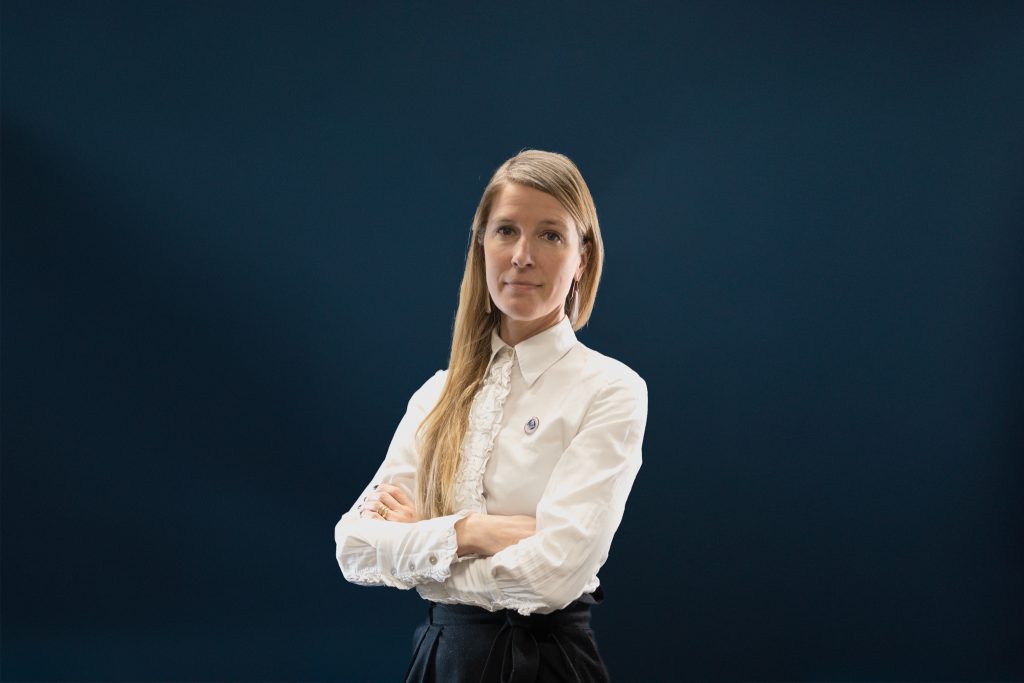My Finland does not tolerate racism of any kind
31.8.2023
Maija Hyle, Director of Non-Profit Activities at the Deaconess Foundation, writes: In my current everyday life, I am in a privileged position in many ways. I represent the mainstream in terms of ethnicity, skin colour, nationality, culture, mother tongue and religion. There have been times in my life when this wasn’t the case. It has been educational to live in a society where the norms did not serve me. I’ve experienced otherness, a feeling of being different and inferior to the dominant social group. The experience was also hurtful. The remarkable thing is that it needn’t have hurt.

Maija Hyle, Director of Non-Profit Activities at the Deaconess Foundation.
I’ve been shouted at and touched inappropriately under the guise of a crowd. In those moments, I would have liked a passer-by or a fellow passenger on the metro to stand up for me. Racist treatment leaves both a memory and an emotional scar. A shuddering feeling that I am not equal. The flash of anger when you are already tense in anticipation of insults and then hear one behind your back. And a retort of well-rehearsed rudeness. It’s worth noting that in my situation, gender was a factor, but being of a different colour and standing out from the crowd made me twice as easy a target.
Racism is racism
It has been sad to listen to the debate on racism in recent months. It is unfortunate that Finland is so cold towards the diversity of our people. I am also surprised that a country that has experienced oppression of all kinds, fought for its existence and relied on the help of other countries should forget history and simplify the truth.
Racism is the belief that one group of people is inferior to another because of, for example, their ethnic origin, skin colour, nationality, culture, mother tongue or religion. Everyone is of equal value, and there is no place for any kind of racist and prejudiced speech or action. Racism is racism, no label makes it acceptable.
The so-called dominant social group, meaning Finns like me, must show support for minorities. We must stand up. We must pass on the right information – and not get caught up in stereotypes or rumours. We must also dare to step into situations, even if it feels uncomfortable. The target of racist abuse cannot choose whether or not to be in the situation. We, as outsiders, can make a choice. Let’s do the right thing.
I increasingly hear about the low threshold for racist remarks being shouted on the street, someone kicking the wheels of an immigrant family’s pram as it passes. The power of example is partly undermining the current atmosphere. When leaders use inappropriate language, others begin to do the same.
This is not my Finland.
Diversity is real and part of everyday life. It is a source of richness. It’s also true that diversity challenges our accustomed ways of doing things and alters our society, and in every culture there are people who do not always behave properly towards others. Whether they are Finns or people from elsewhere. However the bad behaviour of an individual never justifies racism or the stigmatisation of an entire culture.
Actions and words – both are needed
The work of the Deaconess Foundation is based on human dignity, love of one’s neighbour and responsibility. We believe that everyone has the right to a life of dignity. We are side-by-side with them where distress and stigma are greatest and where the experience of human dignity falters.
We take it for granted that every human being is equal and that this is not a matter of opinion. In our work, every day, we are creating a Finland where everyone is equal.
For example, we work with undocumented people in difficult situations and help them navigate complex administrative processes. We run peer groups for mothers who have fled the war in Ukraine, we find Finnish foster families for young people who have arrived alone as minors, and we organise home activities for them. We help Roma in Eastern Europe, young people without jobs or education, and drug addicts living on the streets and organise a wide range of civic activities. We want to ensure that everyone in Finland is seen and heard and feels valued and important as a member of the community.
But action is not enough: it is also extremely important right now to influence the structures and decision-making processes in society. That is why we work systematically and strategically to influence the issues that arise in our day-to-day work, whether it is a humane immigration policy or a policy on drug abuse. We take positions and sometimes disagree, but all our advocacy is based on open dialogue with decision-makers.
From dialogue to reconciliation
We are working to ensure that everyone has a life of dignity. And to experience it as such. The experience of dignity is born out of the connection between people and the lack of it.
Dialogue is a really powerful tool for dealing with all kinds of perspectives, including hearing different voices. Above all, dialogue is about thinking together. But it does not resolve conflicts or seek solutions. In those situations, tools for reconciliation are needed.
As our President said on Tuesday 22 August 2023, “…we should not always aim to change the way other people think. Sometimes it is equally important to show respect, agree to disagree and overlook the differences to see something else that may possibly unite us.”
It is important that we engage in dialogue and listen to one another, but I think what we need now is also active reconciliation.